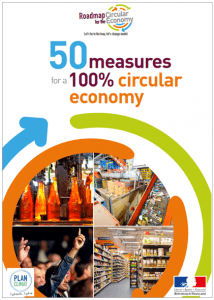The transition towards a circular economy is a key project of the ecological and social transition in France. The situation is clear: France has a long way to go to make progress in the circular Economy. In 2014, the rate of recovery of household and similar waste was 39% - much lower than in Germany (65%) or Belgium (50%). The rest, half of which is organic waste, is therefore incinerated or landfilled, which leads to local environmental pollution and energy waste that is incompatible with the French climate objectives.
With regard to improve waste management the key objectives are the following:
- Aim to collect 100% of recyclable waste.

- Make the sorting of waste much easier for French citizens.
- Take biowaste out of bins, as this form of waste amounts to 22 million tonnes that can be recovered.
- Accelerate the introduction of pricing incentives for waste management.
- Ensure that companies and government agencies that produce large quantities of waste meet their obligations with regards to sorting the five most easily recyclable types of waste: metal, paper, wood, plastic and glass.
- For construction waste: set sorting and recycling targets during demolitions but also during the construction phase.
For achieving these objectives 50 measures for a 100% circular economy are proposed. In relation to better management of biowaste the following measures are foreseen:
Facilitate the development of biowaste sorting by local authorities.
- This will result, in particular, for local authorities that to wish, in the adoption of a two-stage biowaste source sorting implementation plan. A first step that aims to temporarily ensure the collection of biowaste comparable to household biowaste (restaurants, community canteens, etc.). Then a second step to roll out this source sorting to household biowaste.
Recovery of all quality biowaste and enabling the agricultural sector to drive the circular economy.
- Strengthen the existing standards for recycled based fertilizers and take care not to degrade the value created thanks to sorting by mixing uncontaminated organic matter (raw or sorted at source) with lower quality biowaste.
- Encourage the use of fertilizers from renewable resources in agricultural production, the development of the procedure to remove the waste status of fertilizers produced from high-quality recycling processes, and the revision of the display and labelling of fertilizers and crop boosters to better highlight agronomic qualities, origin and process of composts and digestates from the circular economy compared to other forms of fertilizers.
You can access the Roadmap for a Circular Economy here.

